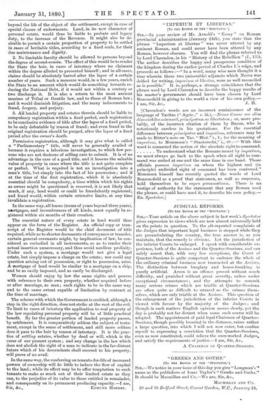" IMPERI1DI ET LIBERTAS."
(TO THE EDITOR Of THE " SPECTATOR:1
Sia,—In your review of Mr. Arnold's " Essay " on Roman provincial administration (January 24th), you state that the phrase " Imperium et libertas " was never uttered by any eminent Roman, and could never have been uttered by any Roman, however obscure. You will find the phrase referred to by Lord Clarendon, in his "History of the Rebellion" (I., 135). The author describes the happy and prosperous condition of the kingdom during the earlier period of Charles I.'s reign, and proceeds as follows :—" In a word, many wise men thought it a time wherein those two (miserable) adjuncts which Nerva was deified for writing, imperium et libertas, were as well reconciled as is possible." It is, perhaps, a strange coincidence that the phrase used by Lord Clarendon to describe the happy results of his master's government should have been chosen by Lord Beaconsfield in giving to the world a view of his own policy.— [Clarendon's words are an incorrect reminiscence of the
language of Tacitus (" Agric.," c. arm. res oZirn dissociabiles miscuerit,principatum ac libertatem ; or, more pro- bably, of the incorrect citation of them by Bacon, who is notoriously careless in his quotations. For the essential difference between principatus and iniperiusi, reference may be made to Ritter's note on Tac. " Hist." i., 1; for the meaning of imperium, to Mommsen's " Staatsrecht," i., 4.9 :—" With this word is connected the notion of the absolute right to command.
To understand what the Romans meant by imperiunz, we must always go back to the epoch when all right to com- mand was united at one and the same time in one hand. Those officials possess imperium on whom the highest and (in principle) undivided right of command has been conferred." Mommsen himself has recently quoted the words of Lord Beaconsfield as a proof that statesmen, as well as emperors, hold themselves to be supra grammtaticam. There is no vestige of authority for the statement that any Roman used the phrase, or could have used it, to describe his own policy.— En. Spectator.]


































 Previous page
Previous page